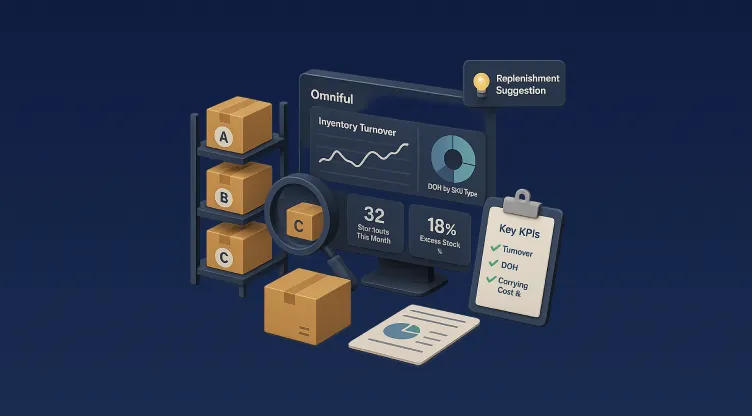Warehouse Management Systems in Food & Beverage: A Fresh Approach to Batch Tracking, Expiry Control, and Storage Needs
Table of Contents
Fresh Take: What You Should Know Before Reading On
- Accurate batch tracking prevents recalls and supports food safety compliance
- Expiry date monitoring ensures first-expired-first-out (FEFO) inventory flow
- Special storage settings like temperature control are crucial in food logistics
- A WMS reduces waste, boosts traceability, and enhances customer trust
- Omniful’s Warehouse Management System supports all three—batch, expiry, and storage
Introduction: Why WMS is a Game-Changer for the Food & Beverage Sector
In the MENA region, where climate, regulations, and consumer expectations constantly shift, running a successful food and beverage (F&B) business involves much more than stocking shelves. From Riyadh to Cairo, F&B companies must navigate temperature-sensitive storage, dynamic expiry dates, and complex supply chains.
This is where a Warehouse Management System (WMS) tailored for the F&B industry becomes invaluable. A smart WMS doesn't just track inventory—it ensures products stay fresh, compliant, and safe. In markets like Saudi Arabia and the UAE, where demand for fresh and ready-to-eat food is soaring, having a system that handles batch, expiry, and storage requirements is no longer optional. It’s a competitive necessity.
Understanding the Core Challenges in Food & Beverage Warehousing
Regulatory Pressures
Food businesses in MENA must comply with local and international food safety standards like SFDA (Saudi Food and Drug Authority) and ISO 22000. Without real-time tracking and traceability, even small errors can trigger penalties or product recalls.
Shelf Life Constraints
Whether it's dairy, bakery items, or frozen meats, shelf life is limited. Traditional warehouses struggle with FIFO (First In First Out) or FEFO (First Expired First Out) logic. Without expiry tracking, items often expire unnoticed, leading to both financial and reputational losses.
Diverse Storage Conditions
F&B products require varied storage environments: chilled, frozen, ambient, or dry. Managing these zones under one roof is complex, especially without automation. Manual processes increase risks of cross-contamination or incorrect storage.
High Turnover and SKU Volume
The sector typically handles high order volumes and product variations. It’s not just about stock levels; it’s about precise IMS (Inventory Management System) integration across SKUs with varied expiry dates, batch numbers, and handling needs.
The Meaning and Importance of IMS in Food Warehousing
IMS or Inventory Management System isn’t just a database—it’s the digital brain of warehouse operations. For food warehousing, IMS means:
- Tracking quantity and quality in real time
- Mapping inventory across multiple bins or zones
- Supporting mobile-based adjustments for damaged or expired stock
- Enabling barcode and serialization-based traceability
With solutions like Omniful’s Inventory Management System, businesses can visualise each product's journey—from supplier to shelf—with confidence.
Key Features of a WMS for F&B That Actually Make a Difference
Batch and Lot Management
Batch management links inventory to specific production or purchase events. This feature enables:
- Quick traceability during quality issues
- Regulatory compliance with local laws like SFDA and international food laws
- Targeted product recalls
Lot tracking narrows down expiry timelines for perishable goods, offering clear insight into product viability.
Expiry Date Configuration
Omniful’s WMS allows automated tracking of expiry dates, near-expiry thresholds, and expiry-based picking strategies. The system ensures the right item is picked at the right time.
Benefits include:
- Reduction in expired stock waste
- Increased customer satisfaction
- Simplified audit trails for regulatory checks
Multi-Zone Temperature Control and Special Storage
Food warehouses often contain multiple zones:
- Cold storage (chilled/frozen)
- Ambient temperature rooms
- Dry storage areas
With smart WMS zoning features, storage areas are assigned based on item requirements. Items like meat and dairy go straight to their optimal temperature zones, minimising spoilage risk.
Omniful enables warehouse managers to define custom zones, set automated putaway rules, and ensure compliance with temperature-sensitive logistics.
Serialization and Barcode Integration
Serialization links each product to a unique identifier. This facilitates:
- Transparent, real-time product tracking
- Accurate picking with location scans
- Automated recall processes
- Seamless multi-channel syncing
Omniful’s WMS supports barcode scanning for each movement—picking, packing, or returns—across mobile and handheld devices.
Inventory Sync and Multi-Hub Control
F&B brands operate across multiple cities and channels. The system should not just track “what’s in stock,” but also where and in what condition.
Features such as:
- Real-time multi-hub tracking
- Stock transfer logs
- SKU bin mapping
- Inbound and outbound movement audits
These make cross-location visibility and stock balancing not only feasible but efficient.
How Smart WMS Reduces Food Waste
A 2022 report by the Gulf Cooperation Council (GCC) highlighted that 30% of food waste in the region stems from poor storage and logistics. With expiry and batch tracking, a WMS:
- Triggers alerts before expiry
- Suggests timely discounting or donation
- Avoids over-ordering through historical trend analysis
- Allocates storage optimally to avoid cross-contamination
Omniful’s platform integrates expiry-based logic directly into the pick-pack-ship flow, ensuring that food is not just moved quickly—but moved correctly.
MENA-Specific WMS Use Case: From Riyadh to the Shelf
Let’s take an example of a Saudi-based dairy brand distributing across Riyadh, Jeddah, and Dammam.
Without WMS:
- Stockouts occur due to poor inventory tracking
- Expired items reach stores, causing returns
- Compliance fines due to missing traceability
With Omniful’s WMS:
- Each batch logged upon receipt using GRN (Goods Receive Note)
- Automated expiry tracking with alerts for near-expiry products
- Zoned putaway into chilled storage immediately
- Real-time updates sent to Order Management System and sales channels
Result? Less waste. More sales. Higher customer confidence.
Integrations That Power an Ecosystem
Food and beverage logistics thrive on speed and data transparency. Here’s how Omniful’s WMS integrates seamlessly across the ecosystem:
- Returns Management: Handles returns due to spoilage or quality issues with proper inventory adjustments.
- Plug and Play Integrations: Instant sync with Shopify, Salla, Talabat, or in-store POS.
- Shipping Gateway: Connects directly with temperature-controlled shippers, with automated waybills and labels.
This ensures a closed loop— from goods receipt to final mile delivery.
The Future: AI, Predictive Analytics, and Demand Forecasting
Next-gen WMS for food logistics will not just track but predict.
Omniful is rolling out AI modules that offer:
- Shelf-life based demand forecasting
- Suggested reorder points for expiring stock
- Dynamic slotting based on item turnover
These features ensure that businesses stay ahead— not just compliant but competitive.
Why Omniful is Built for MENA’s Food Supply Chain
What makes Omniful unique for F&B logistics in the region?
- Built in Riyadh with region-first compliance logic
- Arabic and English UI
- Fast onboarding with branded dashboards
- WMS supports dark stores, fulfilment centres, and hyperlocal deliveries
From multinational chains to artisan bakers, Omniful’s modular WMS ensures the right product reaches the right shelf—fresh, traceable, and on time.
Final Thoughts: You Can’t Afford to Store Food the Old Way
The F&B sector has zero room for error. One misstep in tracking, one missed expiry, and you lose trust, profit, and potentially, your license.
A smart WMS empowers food businesses with visibility, control, and agility. Whether you’re managing hundreds of SKUs or just starting to scale, investing in WMS tailored for the unique needs of food logistics is the best decision you can make today.
Frequently Asked Questions
How does batch tracking help food businesses?
It ensures traceability, supports recalls, and links each product to its production or receipt history.
Can WMS prevent expired stock from reaching stores?
Yes. Automated expiry date monitoring and alerts ensure only fresh items are picked and shipped.
Does Omniful support temperature-sensitive storage management?
Absolutely. It allows customised zones and workflows based on item-specific storage needs.
What is the difference between WMS and IMS?
WMS covers the entire warehouse operation. IMS refers specifically to stock visibility, tracking, and adjustments.
Can the system handle multiple warehouses across cities?
Yes. Omniful offers real-time multi-hub tracking with individual storage rules for each location.























